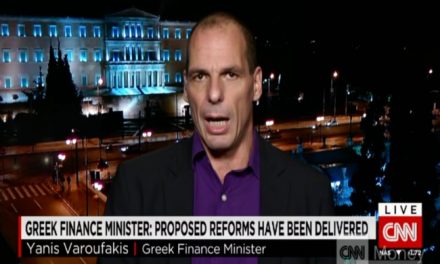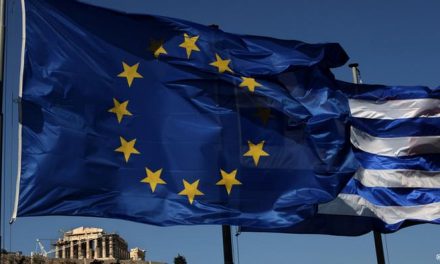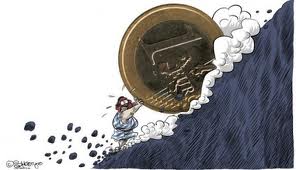By Holly Ellyatt, CNBC
The deadlock between Greece and its creditors over reforms went from bad to worse on Thursday as one of its lenders — the International Monetary Fund (IMF) — quit talks, throwing the negotiations into crisis.
Talks between Greece and the bodies overseeing its bailout program have hit multiple obstacles over the course of the last four months. However, the situation worsened yesterday when the IMF announced that its delegation had left negotiations in Brussels because of “major differences” with Athens over how to save the country from bankruptcy.
Jakob Christensen, senior economist at Exotix, told CNBC that the move sent a “clear message” to Greece that it needed to compromise – and fast.
“(The move) clearly sends a signal to the Greek government that the stakes are very high and there is very little room for more concessions from the IMF side,” he told CNBC Europe’s “Squawk Box” on Friday.
“They (the IMF) have moved quite a lot since the start of discussions, both on the fiscal targets and labor market reforms, and now they’re not prepared to go further.”
‘Fully engaged’
The unexpected move will pile yet more pressure on an already-struggling Greece. Prime Minister Alexis Tsipras has clashed with creditors over the reforms expected in return for aid, particularly changes to taxes, pensions and the labour market.
Speaking to reporters in Brussels, where the talks were taking place Thursday, IMF spokesman Gerry Rice told reporters: “There are major differences between us in most key areas,” Reuters reported. “There has been no progress in narrowing these differences recently, and thus we are well away from an agreement.”
Rice said the IMF’s technical team had left Brussels, but emphasized that the Fund remains “fully engaged” with Athens. Greece owes the IMF 1.5 billion euros ($1.68 billion) on June 30, but without a deal, there is little sign the country will be able to make the payment.
Speaking at a summit of European Union and Latin American leaders in Brussels Thursday, European Union President, Donald Tusk, said it was time for decisions – not more negotiations.
“It’s my opinion that the Greek government has to be a little more realistic,” he said.
Who will blink first?
Following this deterioration in relations, the German government is reportedly holding “concrete consultations” on what to do in the case of a Greek bankruptcy, German newspaper Bild said, citing several people familiar with the matter.
Earlier in the week, there were reports that Germany could be ready to offer Greece some kind of staggered aid deal, where every reform implemented released more aid, although a German government spokesperson denied these rumors.
Chief analyst at CMC Markets, Michael Hewson, said he believed that Greece and its creditors were waiting for each other to capitulate on reforms.
“It would appear that each side thinks the other is bluffing, with Greek officials banking that U.S. pressure could well see the EU compromise or that Angela Merkel won’t want to go down as the German leader who oversaw the beginnings of the break-up of the single currency,” Hewson said.
However, Hewson added that more sympathy (and rescue funds) from Germany looked unlikely. Merkel would need her party’s backing to unlock any new funding for Greece, but many within the party – not least, the country’s Finance Minister, Wolfgang Schaeuble — oppose further aid.
Against such an inhospitable backdrop, Hewson warned: “There is a growing feeling that the day of reckoning is fast approaching.”



















